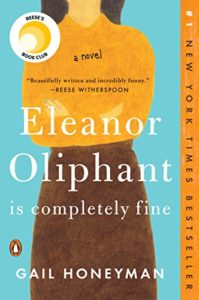Gail Honeyman’s Eleanor Oliphant is Completely Fine is one of the most captivating novels I’ve read this year.
You know something is amiss with Eleanor right from the start. She applies for a job in Glasgow, Scotland, sporting a black eye, missing teeth, a broken arm, and an old scar on her cheek. Even with these marks of violence, she’s hired for an accounts receivable position, which she does with crisp efficiency. She tends to business and doesn’t involve herself with office gossip. Eleanor keeps to herself. She doesn’t share her life, nor does she show interest in anyone else’s. She follows a strict schedule. On weekends she treats herself to take-out pizza and vodka. Every Wednesday evening she talks to her mother on the telephone, a depressing, insulting conversation that leaves Eleanor depleted. Her only entertainment is working the newspaper’s crossword puzzles.
Eleanor has a problem with her computer at work and asks Raymond, the IT guy, for assistance. Later, he asks her to join him for lunch. It’s nothing Eleanor wants to do, but feels it would be impolite to refuse. On the way, they encounter an old man who has passed out on the street. They stay with him until help arrives. Raymond suggests they visit the old man in the hospital to see how he is doing. Although this is way too much social life for Eleanor, she accepts, seeing the good that it might do the patient. One thing leads to another, and Eleanor accepts another invitation, this time from the man’s family to attend a birthday party. She sees for the first time a closely knit family, a family who laughs and accepts one another with love and patience.
Along the way we learn more about Eleanor. She was shuffled from one foster family to another. She loved school—it was her only joy. Slowly, slowly we learn more about her. Or do we?
When a crises occurs, Eleanor’s life is revealed—not only to the reader, but to herself.
I loved this book. Eleanor’s existence is so painful, I ached for her, but I laughed at her preciseness, too. Honeyman does an excellent job of depicting this type of personality and the internal suffering that belies what we first see in individuals who are “different.” I highly recommend Eleanor Oliphant is Completely Fine.


